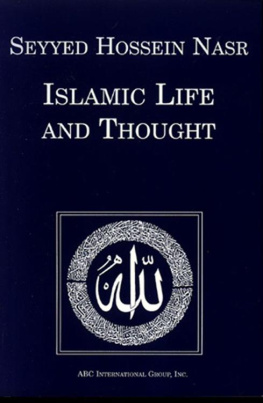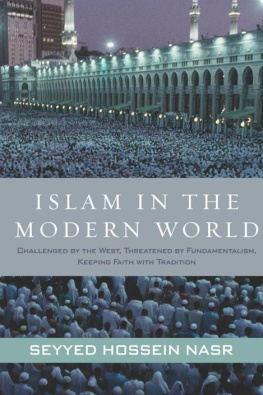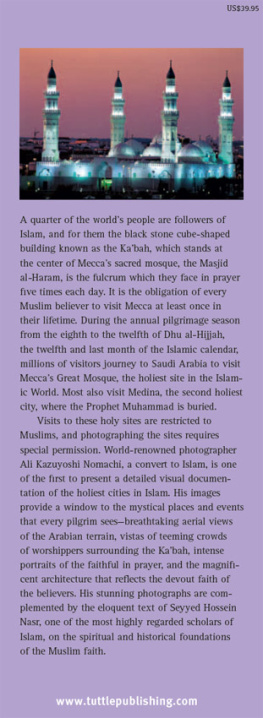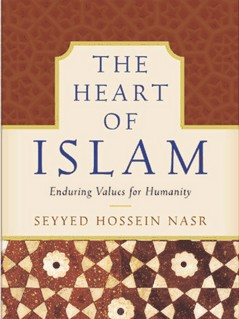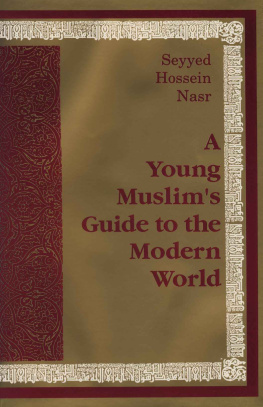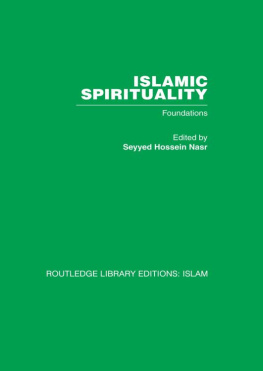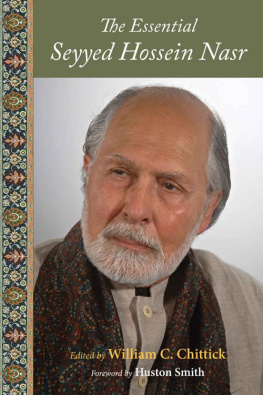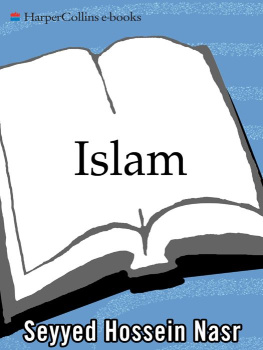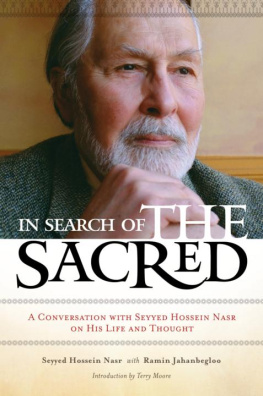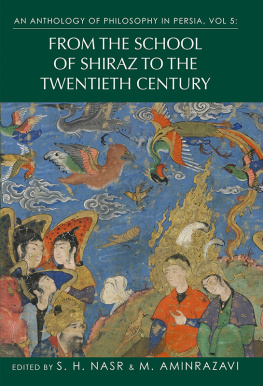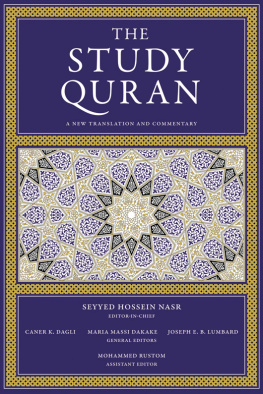Seyyed Hossein Nasr - Islamic Life and Thought
Here you can read online Seyyed Hossein Nasr - Islamic Life and Thought full text of the book (entire story) in english for free. Download pdf and epub, get meaning, cover and reviews about this ebook. year: 2001, publisher: Kazi Publications, genre: Religion. Description of the work, (preface) as well as reviews are available. Best literature library LitArk.com created for fans of good reading and offers a wide selection of genres:
Romance novel
Science fiction
Adventure
Detective
Science
History
Home and family
Prose
Art
Politics
Computer
Non-fiction
Religion
Business
Children
Humor
Choose a favorite category and find really read worthwhile books. Enjoy immersion in the world of imagination, feel the emotions of the characters or learn something new for yourself, make an fascinating discovery.
- Book:Islamic Life and Thought
- Author:
- Publisher:Kazi Publications
- Genre:
- Year:2001
- Rating:5 / 5
- Favourites:Add to favourites
- Your mark:
- 100
- 1
- 2
- 3
- 4
- 5
Islamic Life and Thought: summary, description and annotation
We offer to read an annotation, description, summary or preface (depends on what the author of the book "Islamic Life and Thought" wrote himself). If you haven't found the necessary information about the book — write in the comments, we will try to find it.
Islamic Life and Thought — read online for free the complete book (whole text) full work
Below is the text of the book, divided by pages. System saving the place of the last page read, allows you to conveniently read the book "Islamic Life and Thought" online for free, without having to search again every time where you left off. Put a bookmark, and you can go to the page where you finished reading at any time.
Font size:
Interval:
Bookmark:
Seyyed Hossein Nasr
Islamic Life and Thought
ABC International Group, Inc.
Seyyed Hossein Nasr 2001
No part of this book may be used or reproduced in any manner whatsoever without written permission except in the case of brief quotations embodied in critical article and reviews. For further information, please contact the publisher.
Library of Congress Cataloging in Publication Data
Nasr, Seyyed Hossein.
Islamic Life and Thought
Includes index.
1. IslamAddresses, essays, lectures. I. Title BP25.N27 909\097671 81-4723 ISBN pbk 1-930637-14-4 AACR2
Cover Design
Liaquat Ali
The calligraphy on the cover is from 24:35 of the Quran: "Allah is the Light of the heavens and the earth."
Published by
ABC International Group, Inc.
Distributed by
KAZI Publications, Inc.
3023 W. Belmont Avenue
Chicago IL 60618
(T) 773-267-7001; (F) 773-267-7002
email:
Contents
Introduction
Law and Society
- Religion and Secularism, their Meaning and Manifestation in Islamic History
- The Concept and Reality of Freedom in Islam and Islamic Civilisation
- The Shad'ah and Changing Historical Conditions
- The Immutable Principles of Islam and Westernised Education in the Islamic World
Cultural and Intellectual Life
- A Typological Study of Islamic Culture
- A Panorama of Classical Islamic Intellectual Life
The Sciences
7The Cosmologies of Aristotle and Ibn Sina: a Comparative Study in the Light of Islamic Doctrines
- The Meaning of Nature in Various Perspectives in Islam
- Hermes and Hermetic Writings in the Islamic World
- From the Alchemy of Jabir to the Chemistry of Razi
- The Study of Natural History in the Islamic World
Philosophy
- The Pertinence of Studying Islamic Philosophy Today
- Islamic Philosophy - Reorientation or Re-understanding
- The Life, Doctrines and Significance of Sadr al-Din Shirazi (Mulla Sadra)
- Mulla Sadra as a Source for the History of Islamic Philosophy
- Mulla Sadra and the Doctrine of the Unity of Being
- The Polarisation of Being
Sufism
- The Interior Life in Islam
- Contemplation and Nature in the Perspective of Sufism
Postscript: The Islamic Response to Certain Contemporary Questions
Jesus Through the Eyes of Islam
The Role of Women - The Islamic View
Why do Muslims Fast?
Why We Should Keep the Hijrah Calendar
In the Name of God - Most Merciful, Most Compassionate
Introduction
Islam is at once a religion and a civilisation and social order based upon the revealed principles of the religion. It is an archetypal reality, residing eternally in the Divine Intellect, and an unfolding of this reality in history and in the lives of numerous generations of men from different races and ethnic groups and different localities spreading over most of the surface of the earth. Islam cannot be reduced to a historical phenomenon because its immutable principles and sacred forms are of a non-temporal nature; yet it is also a historical reality of dazzling dimensions. Nor can Islam be considered solely in its cultic sense, although the cult and the practices related to it lie at the heart of the Islamic tradition.
Moreover, the Islamic tradition cannot be confined solely to the message which was received in the form of the Holy Quran by the Blessed Prophet - upon whom be blessings and peace - fourteen centuries ago, although of course this message has been and will always remain the heart of all that is Islamic. Islam includes, in addition to this heart, its unfolding in time and space and all that it absorbed according to its own genius and made its own through its power of transformation and synthesis. Thus not only are the Holy Quran and Hadith Islamic, but also the sacred forms of Islamic art, schools of Islamic philosophy and the sciences, and Islamic social and political institutions are Islamic whatever may have been the historical origin of the 'matter' which the Islamic tradition absorbed and imbued with the form of Islam. The Holy Quran and Hadith, as well as the oral instructions and the grace or barakah issuing from the revelation of the Holy Quran and its recipient, the Blessed Prophet, are like the roots and the trunk of the tree of the Islamic tradition. The arts and sciences, social institutions and the like are the branches of the tree, some located closer to the trunk and others farther away but all a part of its organism and nourished ultimately by the roots. Some of the 'branches' like Islamic art reflect directly the inner aspects of the Islamic revelation and are indispensable to the tradition. Others like certain schools of thought reflect these principles less directly and are more incidental to the tradition. Yet they too have fulfilled and continue to fulfil a necessary function for certain types of mentalities. Otherwise they would not have come into being nor gained the right of entrance into the 'city9(madinah) of Islam.
In modern times, as a result of the loss of the universal perspective of tradition or din among the vast majority of Western orientalists as well as among modernised Muslims, men have lost sight of the unity of the Islamic tradition and the unifying principles which over the ages have bound together the diverse elements of the Islamic tradition. Studies limited to historical and analytical methods have tended through their method of dissection to neglect the living character of the subject of their treatment. They have tended to forget that one can only dissect a living entity after divesting it of its life. People have laboured hard to show that this stone of the courtyard of a particular mosque comes from Roman or Byzantine ruins near by or that that particular word or idea entered into Arabic from Assyrian or Greek, forgetting the function of this stone in the totality of the sacred space of the mosque or that word or idea in the poem or intellectual edifice into which it has become integrated. In too many cases, the loss of vision of principles has turned portents (ayat) into brute facts and a living organism into a cadaver.
It is not that careful historical or analytical studies are illegitimate. On the contrary, they have even existed in traditional Islamic scholarship and have their righHul place in Islamic studies. What is illegitimate from the Islamic point of view is the secular perspective itself to which the analytical method is usually wed and the historicism which opposes metaphysics and the transcendent, and wishes to reduce reality itself to its reflection upon the surface of the flowing river of time. Otherwise, analytical and historical methods can legitimately be used in traditional scholarship and in conformity with the dictates of logic and common sense. They can be integrated into a higher point of view so that their positive features remain but their limitation does not damage the total and universal understanding of things.
Today in the West, as well as in the Islamic world itself, there is an ever greater need to study both the principles and manifestations of Islam from its own authentic point of view and in a manner comprehensible to contemporary man, or at least to one who possesses sufficient intelligence and good intentions. Moreover, this needs to be achieved by using methods of analysis and description which are at once logical and in conformity with the Islamic perspective; for this latter places the highest value upon intelligence (al-'aql) and logic, which is inseparable from it, although of course the transcendent realities cannot be reduced to logical categories. This type of writing which can 'translate' Islamic teachings into a contemporary idiom without betraying it is very important not only for non-Muslims who wish to learn about Islam but most of all for young Muslims, who are now mainly products of modern educational systems.
Font size:
Interval:
Bookmark:
Similar books «Islamic Life and Thought»
Look at similar books to Islamic Life and Thought. We have selected literature similar in name and meaning in the hope of providing readers with more options to find new, interesting, not yet read works.
Discussion, reviews of the book Islamic Life and Thought and just readers' own opinions. Leave your comments, write what you think about the work, its meaning or the main characters. Specify what exactly you liked and what you didn't like, and why you think so.

